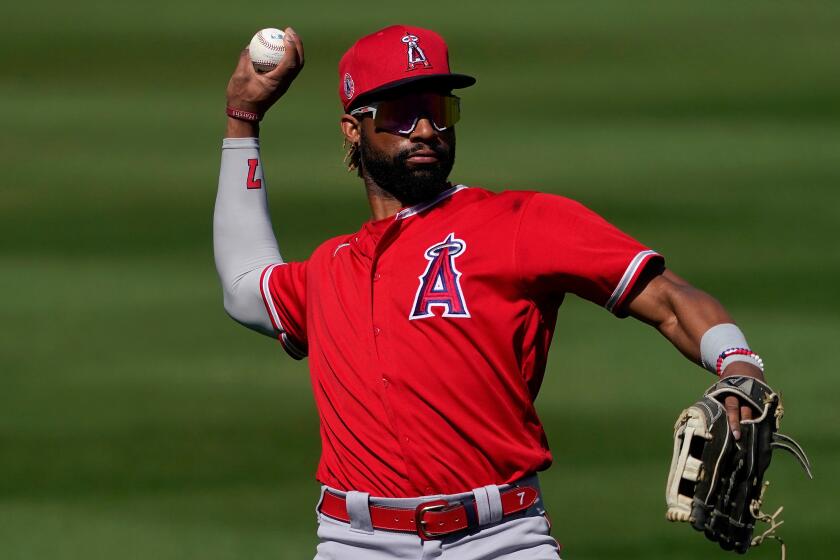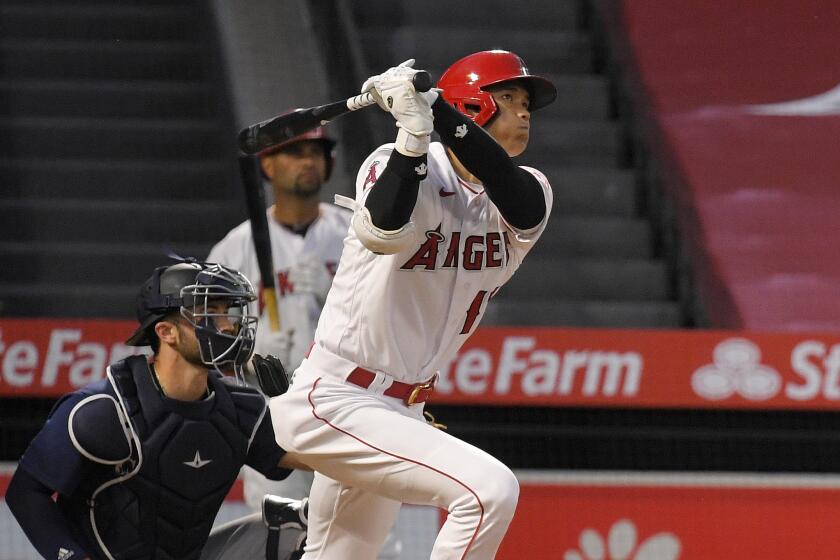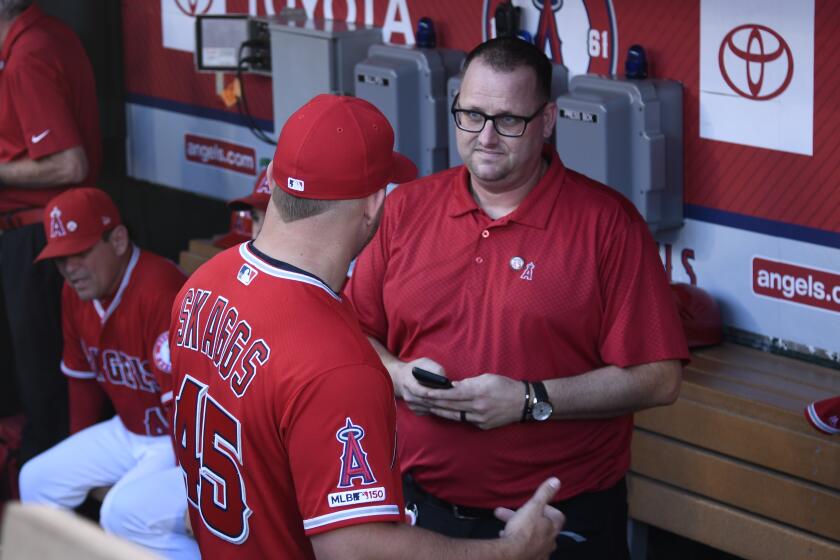Angels manager Joe Maddon is innovative and personable. Will it make a difference?
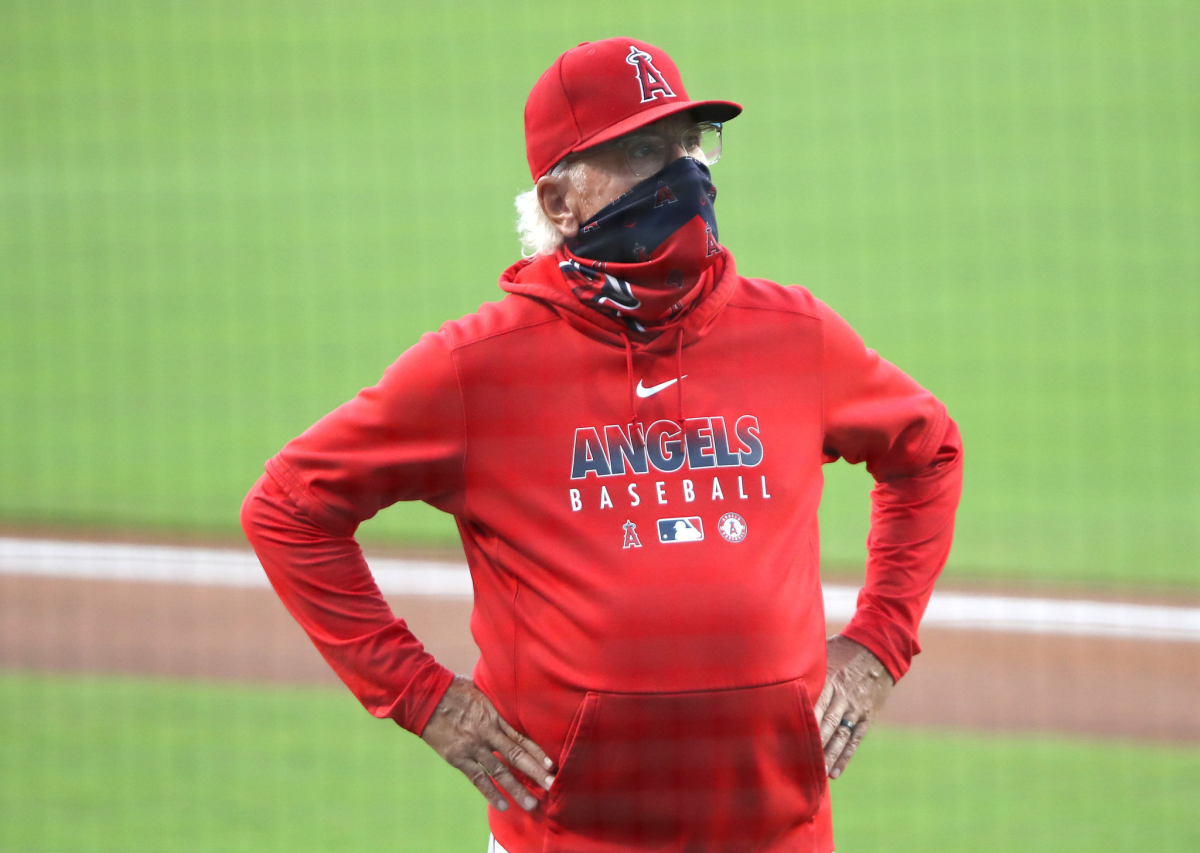
- Share via
Freedom.
That was one of Mike Trout’s initial impressions of playing for Joe Maddon, a key takeaway from his first year around one of baseball’s most distinct, quirky and successful managers.
“He’s all about having fun, but having a purpose — being free,” Trout said. “And I think all the guys are starting to buy into that.”
Consider it an initial introduction, the roots of a budding relationship between a manager and his players that still hasn’t fully blossomed.
In the 18 months since Maddon was hired as the Angels manager, after all, there’s been a shortened spring training, a three-month pandemic shutdown, a socially distanced 60-game season and an offseason of almost solely virtual communication.
Even for one of baseball’s most personable managers, it was difficult last season to make a deep personal bond.
The top 10 Angels minor leaguers include premium prospects Jo Adell and Brandon Marsh, but also several pitchers, including top draft pick Reid Detmers.
“We got away from one another [during the shutdown], then came back in under new rules, right down to the fact that we [coaches] were dressing in the suites and the players were in the locker room,” Maddon said. “There was a lot of disconnection going on.”
Trout put it another way.
“We couldn’t get the full effect,” he said. “The ‘Maddon effect.’”
Indeed, it was Maddon’s track record with the Tampa Bay Rays and Chicago Cubs — the way he managed talent and maximized potential with his gregarious leadership style and analytical baseball acumen — that made him such an attractive candidate to the Angels two offseasons ago.
They hoped he would recreate that winning culture within their talented but underachieving clubhouse, and get the most out of a team that hasn’t been to the playoffs since 2014. They’re about to get their first 162-game sample size to see if it will actually work.
“From a communication standpoint, I don’t think there’s anybody better,” said new general manager Perry Minasian, who didn’t hire Maddon but has praised the 67-year-old manager repeatedly during their first offseason together.
“For me being a first-time general manager, there’s nothing more comforting than having a guy like that in the dugout and clubhouse, who you can give the keys to the car to and let him drive.”
***
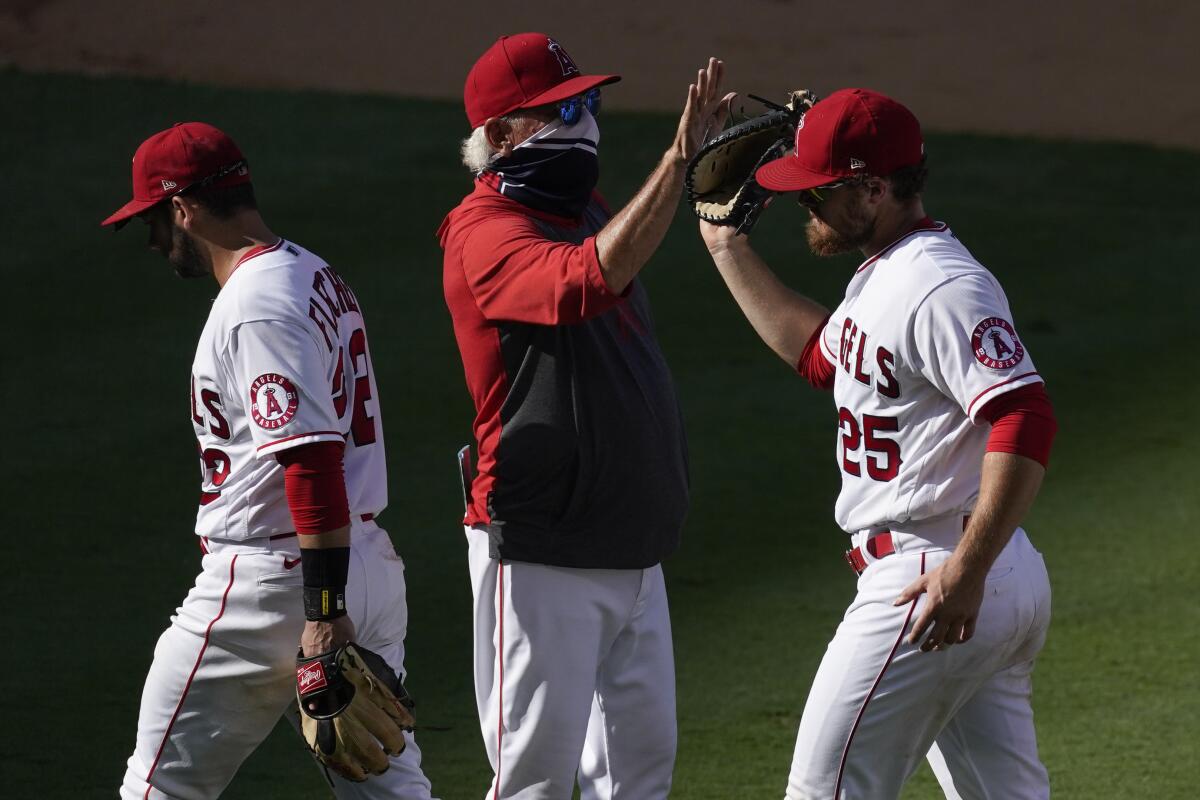
Refreshingly different.
That’s how Carlos Pena described his first impression of Maddon, a vibe that was easy to feel when the infielder joined Maddon’s Rays team in 2007 but much harder to describe.
“He is relatable and complimentary and at the same time gives out constructive criticism,” said Pena, now an MLB Network analyst. “You leave like, ‘I think I’m a better player just by having a conversation with him.’”
A former top prospect, Pena joined the Rays having already played for five organizations and half-a-dozen big league managers. Most of them, he found, were more “traditional” — authoritative and demanding, always maintaining a certain emotional distance from their players.
Pena didn’t think that style was bad. Maddon’s just resonated much deeper.
“He did not force you to respect him,” Pena said. “He earned our respect by relating to us, by having empathy for every single player there and the different situations we found ourselves in.”
An example: In one of his first conversations with Maddon, the manager approached him during a practice and began to explain the theory of … Occam’s razor.
“What in the world,” Pena thought. “Seriously?”
“Playing against him, to be honest, I always thought he was a nutcase.”
— Anthony Rendon, on how he viewed Joe Maddon before joining Angels
Sort of. After a brief philosophical soliloquy — it’s meaning: the simplest answer is usually the right one — Maddon began to laugh. He was joking with his new player, but also sending him a message: You have enough talent. Don’t overthink it.
“Joe Maddon created that environment for me, where I came to the park with an attitude of, ‘I have nothing to lose, so go out there and let your talent express itself,’” said Pena, who went on to a career-best season in 2007 and played for Maddon for four more years. “And he didn’t only do that with me. I think every player [of his] has that type of story.”
Little bonds like that made up the fabric of Maddon’s most successful teams.
The 2008 Rays team that made it to the World Series, rallying around Maddon’s “9=8” mantra: “It was so clever, so simple, so silly — ‘Nine of us playing together, that means we’ll be in the final eight of the postseason’ — but we kind of embraced that,” Pena said.
The Rays’ three playoff appearances in the next five seasons: “[He helps you] understand that you’re good in who you are,” said Angels pitcher Alex Cobb, a member of the latter two of Maddon’s Tampa Bay teams. “He’s just such a positive influence in whoever’s life he’s around.”
And Maddon’s history-making tenure with the Cubs, when he went to three straight National League Championship Series and ended the franchise’s 108-year title drought in 2016:
“He doesn’t mold you and put you in any type of box,” said Dexter Fowler, the Angels new right fielder who played a key role on that Cubs championship team. “You can just go out and he accepts you in your own skin.”
***
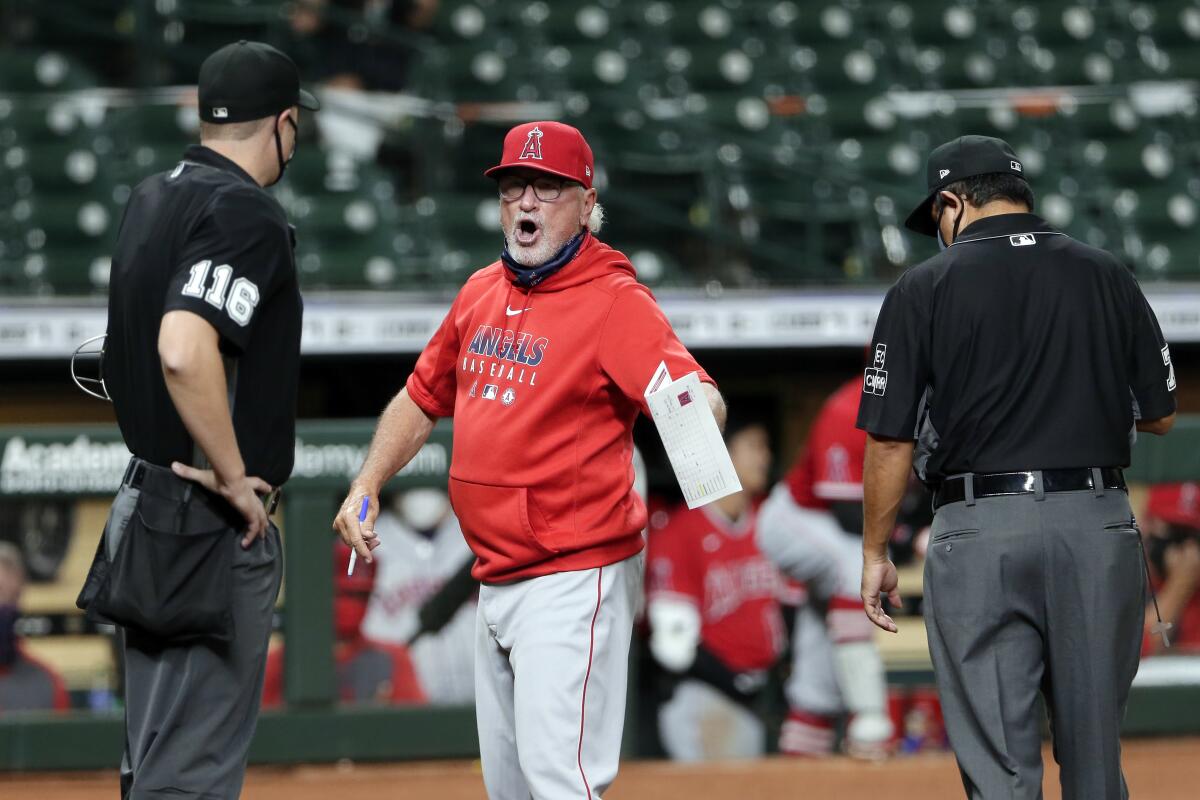
Nutcase.
That was Anthony Rendon’s first impression of Maddon, an opinion he formed well before the two ever shared the same dugout, back when he watched the manager’s quirky antics with an uncertain eye.
That’s changed, however, in the last year. Rendon still finds Maddon peculiar — “You never know what’s gonna come out of his mouth and you never know what he’s thinking, and sometimes those two don’t even correlate” — but in a positive, purposeful way.
“Playing against him, to be honest, I always thought he was a nutcase,” Rendon said. “But now being on the same team as him, and having conversations with him, there’s always a rhyme or reason for why he may do something, even though it might be unorthodox. He did the research, he’s looked at the numbers and he has a gut feeling.”
If the Angels experienced only a portion of Maddon’s methods last year, they’ve gotten a full dosage this spring.
During the offseason, he organized weekly videoconference calls with his coaching staff, each dedicated to evaluating a different basic area of the game: “Defensive concepts, offensive concepts, two-strike approach, dominate the 1-1 count with pitching,” he said. “There’s so many things we would get into.”
While the Astros and Athletics lost significant players in the offseason, the Angels could leap forward simply on the arm and bat of Shohei Ohtani.
From the start of camp, Maddon hammered home those points with his players. He passed out a booklet about outfield defense written by a former Angels instructor. He put his team through meticulous baserunning drills. He took note of how quickly guys ran down the first-base line. He used data and analytics as much as a teaching tool as he did a measuring stick.
His many spring-time mottos have included: “Play like it’s 1985,” promoting an old-school mentality to a team he thought played too tight at times last season; “the renaissance of individuality,” reminding his players not to stray from their strengths; and “the relentless execution of fundamentals,” emphasizing little things he believes will make a long-term difference.
“When the team is not functioning properly, it’s not complicated,” Maddon said. “I think in general, we look for complicated answers or solutions to everything where simplicity normally works better — and it’s normally about fundamentals. It was a big part of my conversation with the team.”
Eric Kay’s attorney seeks to postpone the trial of the former Angels employee, who has been charged in connection with the death of Tyler Skaggs.
Ask 10 people in baseball the impact a manager’s style can make on the field, you might get 10 different answers. Some say it’s incalculable. Others claim it’s overrated. Even Trout had a hard time putting it exactly into words this week, fumbling for the right answer when asked what it’s like playing for Maddon.
“I’m trying to explain myself here,” Trout said between fragmented sentences, leaning forward in his chair deep in thought. “Um . . .”
But finally, Trout got there, summing up something he’s learned — and most of Maddon’s former players already well know.
“[He wants] to get the best out of a person,” Trout said. “That’s his mindset.”
More to Read
Go beyond the scoreboard
Get the latest on L.A.'s teams in the daily Sports Report newsletter.
You may occasionally receive promotional content from the Los Angeles Times.

